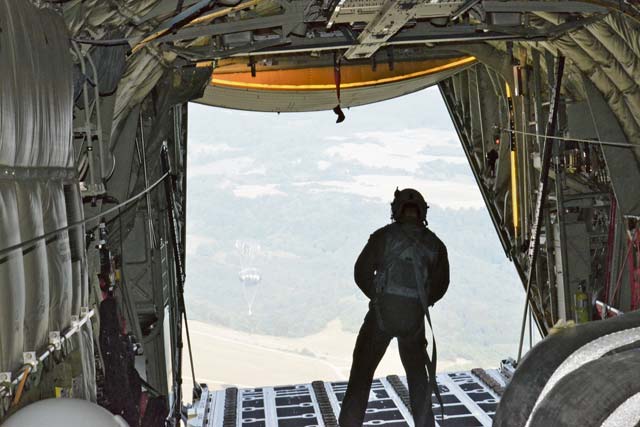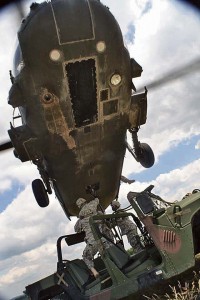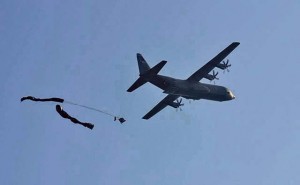
An Airman with the 37th Airlift Squadron observes an air-dropped cargo pallet from the back of a C-130J
On a blustery morning in the middle of an isolated German field full of trees and tall grass, Soldiers hoped to witness an event that hadn’t been seen in over eight years. A Lockheed Martin C-130J Super Hercules aircraft cruised toward a drop zone before it began employing a low velocity aerial delivery system, commonly referred to as LVADS, carrying a payload.
This type of operation is usually conducted in Grafenwöhr, Germany, but Soldiers from the 16th Sustainment Brigade, 21st Theater Sustainment Command, proved the potential for the Baumholder Military Training Area, or BMTA, for large-scale operations June 18.

A UH-60 “Black Hawk” helicopter hovers above a disabled Humvee as Soldiers from the 16th Sustainment Brigade secure the vehicle for transport to the Baumholder Military Training Area. The resupply and recovery exercise used the local German training area for strategic and operational training for the first time in more than eight years.
“The drop zone here is a more realistic area and has real-world hazards when compared to the one in Grafenwöhr, which is flat,” said 1st Lt. Christopher D. Carlstedt, executive officer of 240th Maintenance Company, 16th Sustainment Brigade. “This training operation utilized a vacant German training area, which opens the door to future partnership training and the mutual exchange of ideas with our German counterparts.”
The airdrop was developed during World War II out of necessity to find an easier way to resupply Soldiers faster. A low-velocity airdrop is used for small and larger items such as vehicles. It was designed to slow down the load as much as possible to ensure it impacts the ground with the least amount of force.
“In a non-airborne unit, the task of conducting air-delivery missions is one of great significance,” said Chief Warrant Officer Brian Martin, senior airdrop technician for the 16th SB. “This training exercise showed that we’re capable of performing these types of missions and solidifies the necessity for our placement here. The BMTA has proven to be a viable training resource and assists the 16th SB missions as we work toward a more operational focus.
“By utilizing the BMTA instead of the Bunker drop zone in Grafenwöhr, which is the DZ that we’ve historically always used, we reduce the costs involved in missions located out of Grafenwöhr and increase the amount of available resources here in Baumholder,” Martin continued.
The mission was executed in four phases. The first phase required personnel from the 18th Combat Service Support Battalion to rig, de-rig and conduct drop zone recovery tasks at the 5th Quartermaster Company rigging facility at Rhine Ordnance Barracks in Kaiserslautern.

A C-130J Hercules from the 37th Airlift Squadron completes a low-velocity air delivery system training mission June 18 over the Kirsten Drop Zone at the Baumholder Military Training Area. The joint training exercise demonstrated the ability to perform resupply and recovery operations in a foreign environment.
The second phase consisted of a joint aerial delivery operation combined expertise from Soldiers and Airmen from the 5th QM, the 37th Airlift Squadron and 86th Airlift Wing. The mission required one C-130J aircraft to resupply water and fuel to the 18th CSSB ground forces at the BMTA Kirsten DZ.
The third phase of the exercise required 18th CSSB Soldiers to recover 10 A-22 cargo bags, each configured with four 55-gallon water drums, in less than 30 minutes after the airdrop. Immediately following the recovery, the Soldiers executed sling load operations at the DZ.
The exercise concluded with the final phase of recovering all air-dropped equipment and parachutes from the DZ.
In peacekeeping operations or humanitarian aid situations, food and medical supplies are often air-dropped using the LVADS technology. Such exercises increase the 16th SB’s operational readiness for times of crisis and combat.
“This operational training exercise proves that we can increase our mission,” Martin said. “It’s one more lesson learned to promote the use of this available training area and employ more diverse and expansive exercises here in Baumholder.”







